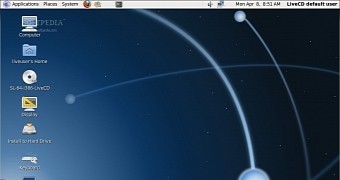Fermilab, the makers of the Scientific Linux distribution based on the Red Hat Enterprise Linux operating system recently announced that they will no longer develop it.
Produced by Fermilab, CERN, ETH Zurich, and DESY, Scientific Linux is an open-source and free Linux-based operating system derived from the freely distributed sourced of Red Hat's RHEL (Red Hat Enterprise Linux). It was first released 14 years ago on May 10th, 2004.
Now, almost 14 years later, those who worked hard to maintain one of the very few GNU/Linux distributions dedicated to science have decided that it's time to rest and no longer publish new releases of Scientific Linux. Scientific Linux 8 was supposed to be the next major version, but it won't see the light of day.
Fermilab's Pat Riehecky announced that the team will soon migrate their computers dedicated to scientific operations at CERN and other institutions to the upcoming CentOS Linux 8 operating system, which should be out later this year based on Red Hat Enterprise Linux 8 series.
"Toward that end, we will deploy CentOS 8 in our scientific computing environments rather than develop Scientific Linux 8. We will collaborate with CERN and other labs to help make CentOS an even better platform for high-energy physics computing," said Pat Riehecky.
Scientific Linux 6.x and 7.x to be receive support until their end of life
At the moment, Fermilab maintains two branches of Scientific Linux, series 6.x and 7.x, based on Red Hat Enterprise Linux 6 and Red Hat Enterprise Linux 7 respectively. These will continue to received support with software and security updates until their end of lives until 2020 and 2024 respectively.
With that in mind, you can still download the latest Scientific Linux releases from our free software portal if you want to install them on your computers. Fermilab said that they are looking forward unify their scientific computing platform with collaborations from other scientific institutions and labs like DUNE.

 14 DAY TRIAL //
14 DAY TRIAL //